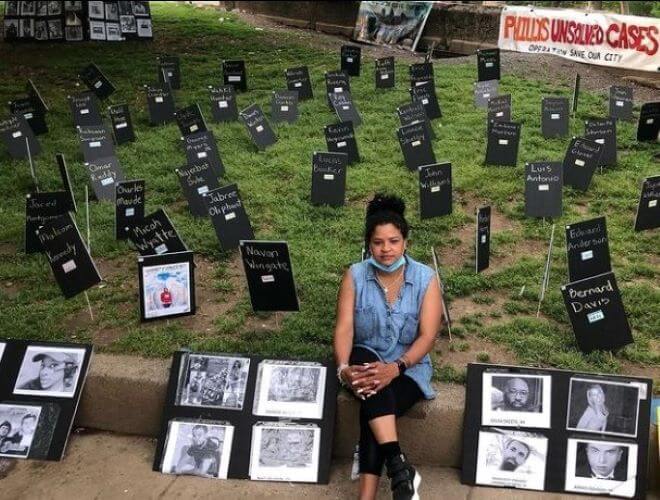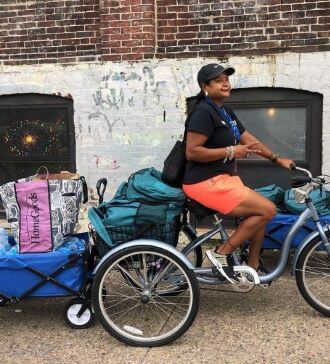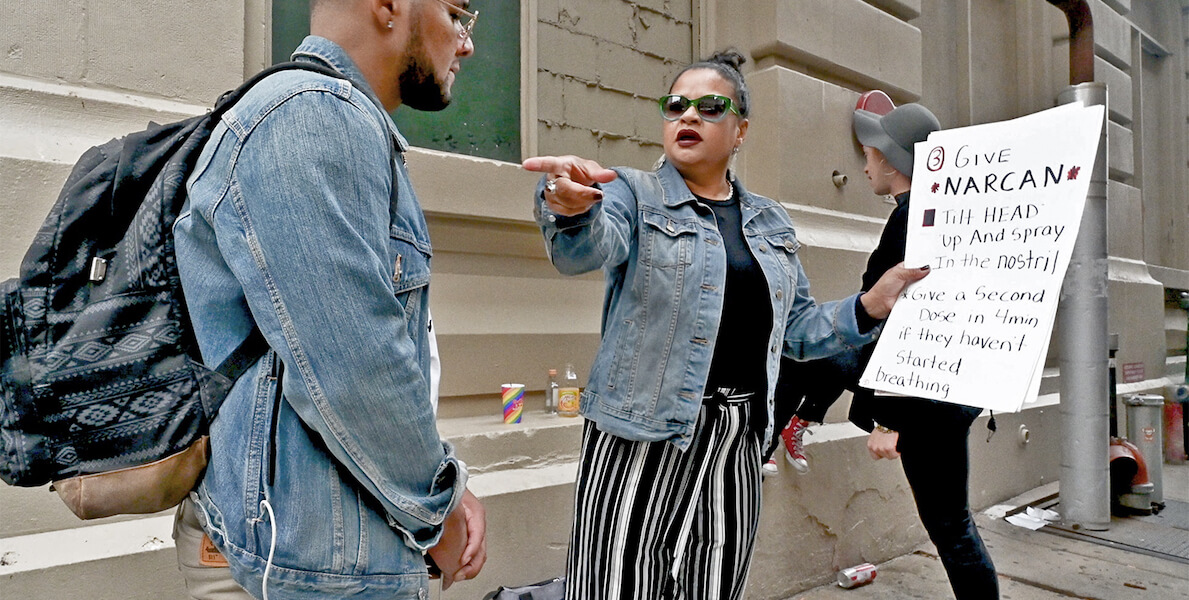Friday, June 3, 2022, 10:30am
On an unseasonably warm June day, Rosalind Pichardo leaves a corner store on Ruth Street and heads to the next stop on East Orleans to distribute a small kit containing a tourniquet, naloxone, latex gloves, and a gun lock. As we cross the street, a group of 20 to 30 men and women, some visibly injured, some shoeless, come rushing en masse from Kensington Avenue and head Northeast on Ruth. She whips several doses of naloxone from her tote, offering them to the crowd. Some take them, some wave her off.
I assumed the cops had rolled up (I learned later that was not a thing). But as they disappear down the street, she explains, “Free samples. Dealers will offer samples of their new inventory to hook customers.”
It makes sense that in the largest open-air drug market in the U.S., drug dealers have a decent grasp of marketing.
Rosaline (Roz) Pichardo is a Kensington activist and founder of Operation Save Our City, a volunteer organization that supports homicide victims’ families in their time of greatest need, offering comfort in grief, home-cooked meals, and crucially, facilitating communication with the police department and drawing attention to unsolved cases.
She carries with her a small Bible documenting each attempt at reversing an overdose, not all successful. The current tally is approximately 900 people.
Pichardo works in harm reduction for the Kensington-based social services organization Prevention Point. For over a year, she has also worked at Temple University Hospital’s emergency department as a trauma victim advocate. For the past two years, she has run DEA-sponsored drug education programs for at-risk youth in Philadelphia schools.
You may have also seen her earlier this year in a naloxone PSA from the Pennsylvania Department of Health. She has earned praises from other activists and community outreach organizers, and in June was invited to the White House to witness the signing of the bipartisan gun control bill, the first in decades.
Anti-violence activist Jamal Johnson told WHYY in February, “I really admire that [Pichardo] doesn’t just talk the talk, she walks the walk.” Johnson, who has seen her work reversing overdoses on the streets, joined her during her 10th Annual Campout for Peace in January of this year. “I see her commitment, I see her compassion, you know, I see how she takes it to the heart … She puts her body on the line and her heart on the line.”
After volunteering with Pichardo for a few hours in June, I was finally able to do a formal interview between her ER shift and her shift at Prevention Point, after which she would go home to sleep.
Pichardo possesses a singular strength. Working and volunteering seven days a week, she jokes it’s coffee that keeps her going. But in all seriousness, she says, “I get the energy from all the sadness I see. It’s what heals me. I practice self-care every day.”
Her story has been chronicled in the news and is the subject of a short documentary released earlier this year, Hello Sunshine. The title is a reference to Pichardo’s relationship with the people she serves in her role as a harm reduction worker. Pichardo trains the public on the use of naloxone (a.k.a. Narcan) and is never without it as she passes out basic needs like socks and checks in on those she calls “my sunshines.” She carries with her a small Bible documenting each attempt at reversing an overdose, not all successful. The current tally is approximately 900 people.

The other homicide victims
Pichardo grew up in and around Kensington and North Philadelphia. She believes her motivation to serve is inherited. Her grandmother was a school janitor and lunch aide, the breadwinner. Her grandfather stayed home to manage the house and kids.
“He’s always been hands-on in the house. And my grandma has always been hands-on in school, taking care of everyone. And my aunts, too. They were hands-on at the elementary school, so it’s like work, work, work. I’ve always found myself in places of service, you know, like anywhere I can help people. That’s where I was hands-on.”
In 1994, her abusive ex-boyfriend Donald Williams threw her off a railroad bridge in an attempt to kill her. He then went to her home, where he murdered her current boyfriend, Talvird Jackson. Williams would go to prison for 15 years and, upon his release, would commit another murder. He is now serving a life sentence.
Now a survivor, Pichardo attended Peirce College and studied to be a paralegal. “I was learning a lot, especially the language of the court system, and just wanting to be part of it. The college thing obviously wasn’t for me,” she laughs, “but I got to learn a bit about the court system.” She stayed busy working and had a son, who is now 25.
In 2001, she lost her identical twin sister to suicide.
In January 2012, Pichardo’s brother Alex was murdered by muggers in Kensington. This tragedy became the catalyst for her work supporting the other victims of homicide: the loved ones of the deceased.
It looks deceptively simple to reverse an overdose using the nasal spray. The victim’s head must be tilted correctly, and you must wait four minutes between doses, performing rescue breaths every five seconds. “The waiting is the hardest part,” says Pichardo.
Watching police procedurals gives the impression that the first stop detectives make is at the door of the victim’s family. In reality, many families don’t know who the investigator is for weeks. “I was looking for communication from homicide detectives, and services that were easily accessible where I didn’t have to wait two weeks for a phone call,” she explains. “Boots on the ground distributing thousands of flyers, you know? Wanted, information, $20,000 award … I wanted to catch my brother’s shooter, and there was nothing like that in place.”
The trauma her family experienced took a heavy toll. “We had no idea what was coming. I called around to all these agencies and just didn’t find help. People want to talk to someone they can relate to. Moms need moms to talk to, sisters need sisters, even dads need dads to talk to, and unfortunately, my dad didn’t have that.” A year after the death of her brother, her father, in rage and grieving, passed away in his sleep.
Alex’s murder has never been solved.
Operation Save Our City
As of the end of August 2022, there have been over 355 homicides in Philadelphia. On average, PPD “clears” (at least one person suspected of committing the murder is taken into police custody for prosecution or the case is exceptionally cleared) between 40 and 50 percent of murder cases every year. The year Alex was killed, 2012, the department solved 52 percent of murders, but in 2016, just 37 percent were solved. These statistics are in line with other major cities across the U.S.
The Philadelphia Police Department maintains a website for submitting tips on unsolved homicides, anonymously if you wish. Started in 2018, the cases listed go back to 2014, but according to the site, outreach to families about older cases is in progress.
Shortly after her brother’s death, Roz visited the site where he was killed. “It was so cold, and the ground was icy. And I said, no one even knows that anything happened here. His memorial had been covered by snow, it looked like nothing. My brother was buried, and no one knew that this is where he died. So that was it for me, they’re going to know my brother.”
Every January since, Pichardo has hosted a three-day campout for families of victims. The fenced-in lot is posted with dozens of images of loved ones brought by families. They share their stories, and take turns calling detectives in charge of their cases for updates. “We make it really productive. We’re feeling each other’s momentum, right?” she says. “So let’s call the detectives, see if it’s active, ask what can we do to help, you know? Is there another flier we can reprint? And then, we might have an art session, or whatever we do — cry. Sometimes we have a cocktail, whatever that self-care may look like for us at the moment.”
Operation Save Our City was founded shortly after that first campout. The approach is simple: Support victims’ families through companionship, listening, facilitating the sometimes frustrating process of working with the police, and of course, bringing meals to the grief-stricken. “We were searching for a lot of things through Operation Save Our City,” Pichardo says. “Trying to find connections with families, supporting families. We’ve been able to encourage mothers to not count 100 percent on us, but to build something from it.”
From the birth of Operation Save Our City came the National Homicide Justice Alliance, and Ray’s Rhythm For Justice Foundation, both started by mothers of homicide victims.
Prevention Point
In 2017, while Pichardo was distributing lunches and snacks from her minivan, she found herself coming across people who were overdosing, and realized she didn’t know what to do. She decided to get trained on how to use naloxone. Prevention Point, which will celebrate its 30th anniversary this year, runs a medical clinic, drop-in center, and a syringe service program for the community. It was there she received her training, and as she puts it, “I’ve been rolling ever since with naloxone.”

It looks deceptively simple to reverse an overdose using the nasal spray. The victim’s head must be tilted correctly, and you must wait four minutes between doses, performing rescue breaths every five seconds.
“The waiting is the hardest part,” she says. When they regain consciousness, you must tell them how many doses they received, so they know how sick they will be. Three to four doses trigger withdrawal symptoms, and they are immediate.
Last year, while reversing an overdose, Pichardo had a dealer at the scene pull a gun on her because she’d called 911. “I was like, I’m done. I can’t do this,” she recalls. After some searching, she found the part-time position at Temple Hospital’s ER, and knew it was something she could do. “I have to help ID the body if they come in without ID,” she says. “I have to take pictures of their tattoos. I have to count the holes in their body. Families often want to know. If they don’t ask, I won’t volunteer that information. But many want details, they want to know they [the hospital] did everything they could.”
Pichardo possesses a singular strength. Working and volunteering seven days a week, she jokes it’s coffee that keeps her going. But in all seriousness, she says, “I get the energy from all the sadness I see. It’s what heals me. I practice self-care every day.”
Stop the Bleed
Joe Quint, director of Hello Sunshine, told The Citizen in an interview in April, “I don’t expect I’m gonna inspire people to go out and do the same kind of work that Roz is doing, because no one would do the same thing Roz is doing: It’s super human. She’s out there on the front line, doing the work, and I’m comforted by the fact that somebody is out there doing this, treating people with respect and dignity and love, you know, because there’s not enough people who do that. So I’m grateful that she’s out there, doing her work.”
Currently, Pichardo is focused on Stop the Bleed, a national program that Operation Save Our City partnered on with Prevention Point and Temple Hospital. This is the source of the kits she distributed to the shops in the neighborhood. Each organization provides components of the kits, and the program offers training for organizations to share with the community in an effort to reduce deaths of gunshot victims by bleeding out.
June 3, 2022, noon
As Roz Pichardo approaches a corner store on East Clearfield Street, a young woman recognizes her, and they stop to embrace and talk. Erin (pseudonym) has close-cropped hair, is dressed in a sleeveless black T-shirt, and her painfully skinny arms sport beautiful tattoo work. Pichardo praises how healthy she looks, and is pleased that she has gained weight.
Outside the next store, she calls out, “Hello Sunshine!” to a shirtless, handsome man with dark hair and tanned skin who appears to be in his thirties. He looks fit but walks with a pronounced hunch. Carl (pseudonym) smiles a lot and speaks slowly. “Good to see you,” he says as they part ways.
That morning, as we packed the Stop the Bleed kits, I held my breath when I saw her pull her small Bible out of her bag and flip through a few pages before hurriedly tucking it away. Her record of every attempt to save a life is beautifully brutal, lives and deaths scrawled across sacred text.
The amount of good that could be done for our communities seems infinite if we all had the energy and compassion Roz Pichardo has. But she believes each of us doing what we can would be enough.
“You can start with something small. It doesn’t have to be all of these things. My trauma is so layered that it needs somewhere to go. So that’s what I’ve learned to do to cope. For someone else, it may be, let me sweep my street. Let me have a cup of coffee with Elaine up the street who just lost her daughter or her son. It can be just meeting people where they are, and if everyone can do that for someone, then we’re doing our part.”
![]() MORE ON FIGHTING DRUGS AND VIOLENCE IN PHILLY
MORE ON FIGHTING DRUGS AND VIOLENCE IN PHILLY



